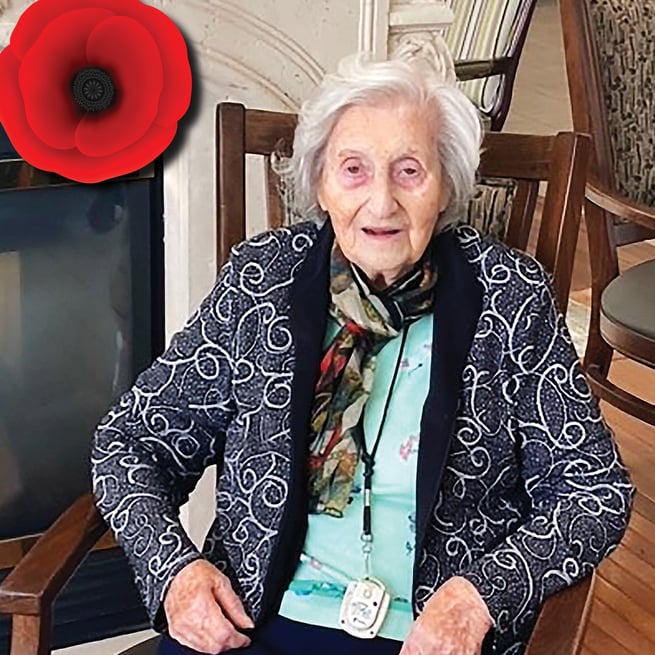
"I can't believe that I could survive the horrors I went through.” This quote tragically sums up Rose Mandelbaum’s early life, before she came to Canada aged 21. Now in her mid 90s, Rose had been through it all before she arrived on in Halifax in 1947 and it’s hard for anyone who didn’t live through World War II to truly understand her viewpoint.
But true to herself and thanks to her incredibly strong spirit, Rose always managed to persevere and ultimately survive. “People who didn’t live through the war didn’t understand how I felt and what I was going through,” she said. “There’s a Yiddish saying: ‘What it was, it was. Pick yourself up and try your best,’ and that’s what I did.”
Life before the war
Even before the atrocities she witnessed and endured, Rose’s life was tough. “I have very few memories from before the war,” she said. ”It felt like such a short life and it went by so fast, but I remember life being very hard. We were very poor.” Born in Kovno (now Kaunas), Lithuania in 1926, Rose was one of three children of Riva and Israel. The middle child, Rose’s older sister was Tiba and her younger sister Sara. Their hardworking and devoted father Israel - whom Rose loved dearly - did his best to keep the family financially afloat.
Sadly he died from an angina attack before WWII began, he was only 38. “I was very close to my father; he was a learned man and a former yeshiva (religious school) student. But with three daughters and a wife to support, he sold cosmetics to barbershops and every day he would schlep (carry) large containers of cosmetics around with him.” Rose - being the strong young woman she was - would often accompany her father to work and speak up for him when barbershop owners would try to defer payment. “No, he has a family to look after! You will pay him now,” she would say.
On a chilly November evening Israel collapsed in the courtyard of the home they were living in and would later die in hospital. This was a huge blow to Rose and her family, but she credits her father’s spirit for guiding and protecting her through the horrors that were to come.
Arrival of the Soviets
Rose’s life began to change in June of 1940 when the Soviets invaded Kovno. They immediately closed all the Hebrew day schools, leaving only one open, which Rose attended for one year. That year of education was crucial to Rose and her family as her mother Riva had been forced to work at a cosmetics factory to earn money following Israel’s premature passing.
A year later, in the summer of 1941, the Soviets sent many children in Kovno to a Communist summer camp in Palanga, a Lithuanian town on the Baltic Sea coastline. This suspicious move by the Soviets was foreshadowing but luckily Rose’s survival instincts were already honed. “I was only there a couple of weeks when we saw German soldiers approaching. They arrested as many Jews as they could find, gathered a number of the men, and then shot them. As soon as I saw the soldiers, I ran far, far away. Luckily, I wasn’t caught.”
The German arrival, a child no longer
“My childhood disappeared on June 25, 1941 when the Nazis invaded Lithuania,” Rose said. She was only 14 years old when the Germans forced all the Jews in Kovno – around 35,000 people – into a ghetto. Rose, Riva, Tiba and young Sara were trapped within the ghetto by Nazi soldiers and forced to live in a dilapidated apartment. The Nazis proceeded to work the eldest members of the family into the ground helping building a German airport in Kovno while little Sara stayed in the apartment.
“Life was terrible. Every day, my mother, older sister and I were sent to work digging trenches,” said Rose. “We would leave at 4:00 a.m. and come back at 4:00 p.m. Every time we left and entered the ghetto, we passed through a large gate that was guarded.”
Even though the weather was freezing Rose, Riva and Tiba only had light clothing on. They were routinely searched and beaten by Nazi guards every time they returned from a day’s working in the trenches. Life for a Jewish person in Kovno at that time was incredibly difficult and painful and “a lot of people gave up,” according to Rose. “They thought, if this is my life, I’d rather die.”
Losing sister Sara and surviving the ghetto
“Then there were the selections. We were never sure if we were going to live another day,” said Rose of the Nazi’s cold, unimaginable murdering strategy. “First, the Nazis selected children and then the disabled and killed them. One day when we got home from work, my little sister Sara was gone. They had taken her and killed her. My mother went crazy with grief and I said to her, ‘Mother, you have two other daughters, you need to live.’
Rose’s distraught mother Riva did continue to live for her daughters and the women survived the selections, the ghetto and its exhausting work schedule for three years until July 1944. In fact Rose, Riva and Tiba were among the last Jews left in the ghetto. That July, Rose and her remaining family members thought their luck had run out when the Nazis put them on a train. “We all thought, ‘this is it, we’re going to die.’ When they put us on the trains, nobody knew if we were going to live. Everybody felt it was the end.”
Stutthof concentration camp
The ominous, dread-filled train journey ended at Stutthof concentration camp where Riva and Tiba were subjected to degrading and intrusive searches by the Nazi guards as they attempted to find any valuables on their incoming Jewish prisoners. “Luckily, they didn’t touch me,” Rose said. “I didn’t have anything anyway. We were poor people.” The family spent three weeks at Stutthof but Rose remembers those three weeks feeling like three years.
“There was one Nazi bastard who I remember particularly. For no reason he would hit us over the head or on our back with his gun. We didn’t have a minute of quiet. He wanted to kill us. One day, I found a piece of red paper on the ground and took it and rubbed it on my mother’s cheeks so it looked like she had a bit of colour. I took her under my wing and looked after my mother for the entire duration of the war.”
From Stutthof, Riva, Tiba and Rose were transported to Auschwitz, arguably the most notorious of all the Nazi concentration camps. Rose and her family were there for three months in appalling conditions and somehow narrowly escaped the gas chamber. Throughout the whole ordeal Rose said her father’s spirit was protecting her. Thankfully there was light coming at the end of the darkest of tunnels.
Change in fortune
“Near the end of the war, we could hear the bombardments. The Germans were getting scared so they evacuated the camp,” said Rose. They forced Rose and her family to walk for three days and three nights - in what we now know were death marches - before letting the family go. Despite being liberated Rose and her family were starving and lost. They embarked on a walk of faith, many miles, searching for a way back to Lithuania. “We travelled by foot because no one would pick us up to give us a lift. We walked, but we were barely living.”
Still deeply traumatized and exhausted, they eventually ended up in Białystok, Poland, where they were gratefully taken in by a Jewish community who helped Holocaust survivors. They gave the family life-saving shelter, clothing and food. Once Rose got her strength back she learned how to type Yiddish from a lawyer, a fellow survivor and began to record the testimonies of survivors. During this time love unexpectedly stepped into Rose’s life.
Cupid’s arrow unexpectedly strikes
“One day, a very handsome gentleman wearing a Soviet uniform came to Białystok. He was an officer in the Polish army stationed in the Soviet Union, and he wanted to know what was going on with the Jewish people. I had a copy of the paper that we published, which had all the information he wanted. Little did I know that man would become my husband.”
Harry and Rose married in Poland in 1945. The Soviets had liberated parts of Poland in 1944 and the rest in 1945. However, Rose and Harry didn’t know where to live or where to go. Right after their wedding, Harry planned to desert from the army as he was weak and suffering physically from the demands of military life. Rose was very keen to help her new husband achieve this goal but more challenges and obstacles were never far away.
Harry jailed for desertion and another escape
“I managed to find him (Harry) civilian clothing. Unfortunately, someone reported him, and he was immediately arrested and put in jail. I had spent only one night with my husband before he was arrested. I couldn’t speak Polish, so I found a Polish boy who acted as a translator and got him to tell the authorities to let him out, insisting that they could figure out what to do with him later. They let him out after two days but assigned two people to watch over him to make sure he didn’t escape.”
Rose stepped in again to alter her future with some quick thinking. One night, she gave the guards watching Harry some whisky and got them drunk which allowed the newlyweds to escape to the train station. Once on the train they managed to leave Poland.
“It was difficult to emigrate from Poland, which was under Soviet control, so we first went to Prague and then eventually to a displaced persons (DP) camp in Landsberg am Lech, Germany. The DP camp was full; since there was no room for us, we had to live outside of the camp. We managed to find a room for rent. We also had to get a proper marriage certificate, which we needed to immigrate to Canada, where we had decided to go.”
New life in Canada and the value of family
Rose, only 21 at the time, and Harry finally made it to Canada’s east coast, arriving in Halifax, Nova Scotia, on December 12, 1947. From there they travelled by rail to Toronto where Harry’s cousin met the couple. Although Rose had made it out of Europe and survived the Holocaust she was still struggling in her life in North America.
“Even though I was glad to be out of Europe, I had nothing and didn’t know how to start a new life. I was heartbroken, stressed. I didn’t know what the future had in store for me. This is too hard for a lot of people to understand.”
Family, however, is what always got Rose through. From the atrocities of the war to struggling in her new life in Canada. “I think I had my father’s spirit guiding me. I always felt him around me. What kept me going, and what still keeps me going, is my family. I was madly in love with my husband, Harry, who passed away September 11, 2002, after a twenty-three-year battle with Parkinson’s disease.
My beloved mother passed away from cancer on January 29, 1980, when she was 76. Today, my children, grandchildren and great-grandchildren mean the world to me. At the end of the day, when I look at them, I think, “this is the reason I survived.” Today Rose Mandelbaum is 96 years old and lives happily at Aspira Kensington Place in Toronto.
You can watch Rose's interview here

.jpg)
